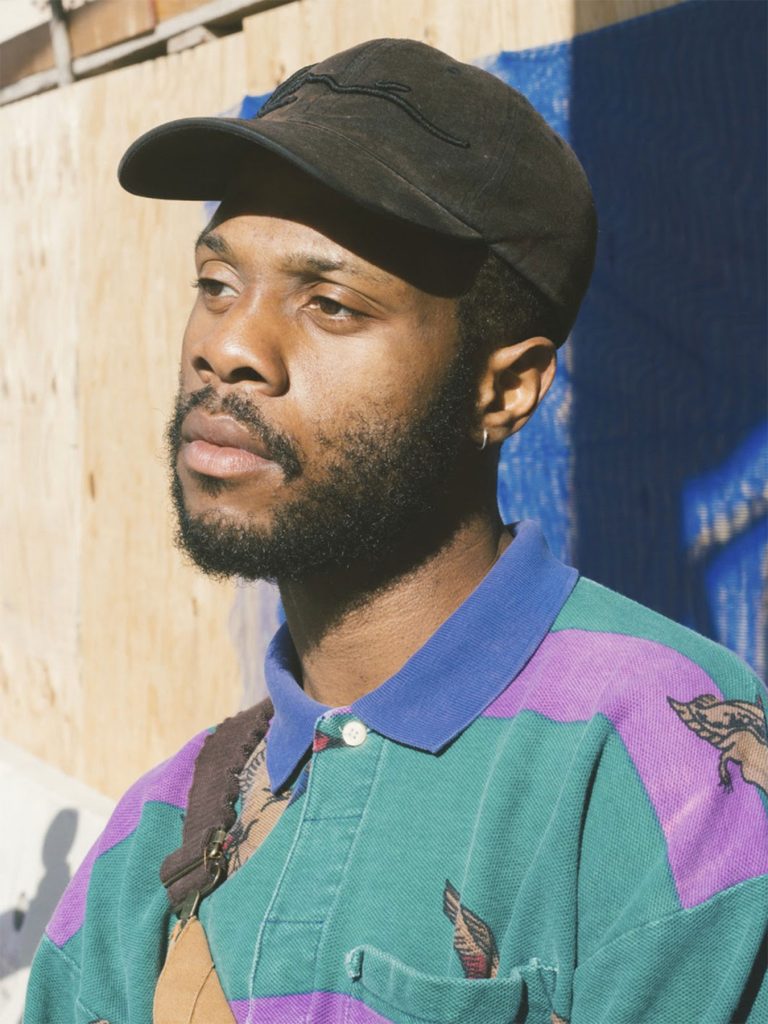It’s tough to box Fat Tony into a single category. For over a decade, the Nigerian-American artist has been a major figure within the underground rap scene, but curiously, it’s not just his rapping ability that’s aided in his reputation—though Tony’s pen does hold mighty sharp.
Tony’s song is a stray from typical weed anthems, changing the overdone theme of “I like getting high” into something informative, and simply different.
Fat Tony is a scenester who has hands in all pockets of DIY culture, be it with punk, hip-hop, or electronic music. He’s a jack-of-all-trades, known for rapping, but also booking shows, being a dominant figure in LA’s art scene and hosting Super Deluxe’s (now defunct, RIP) Thrift Haul show for YouTube. Fat Tony is simply known for being Fat Tony—an artist who knows everyone, does everything, showcases artistic growth and maturity on a daily basis, and refuses to show any sign of stopping anytime soon.
Although Tony was born and raised in Houston, Texas (“Third Ward, Houston—a neighborhood that’s been home to some real legends like Beyoncé, Big Moe, and more”), the artist isn’t pinned down by a specific location. “I consider Houston, Mexico City, Los Angeles, and Brooklyn as homes because they’ve each made such a big impact on my life,” Fat Tony says via text, on the road of his current tour alongside Cadence Weapon and Hua Li.
Inspiration at Home and on the Road
His residences can be heard throughout his work; producer Shaka Girvan (GLDN_EYE aka Tom Cruz) worked with Tony on his debut 2010 studio album RABDARGAB while he was in Houston, and the two linked up again in Brooklyn with 2012’s Double Dragon and 2013’s Smart Ass Black Boy. “I went on tour at the top of summer 2012 pretty much until the winter,” Fat Tony recalls. “I moved back to Houston but still visited Brooklyn frequently, damn near living there most of 2013.” Fat Tony also hosted a monthly hip-hop party in Mexico City called Function and linked up with locals to produce music with its diverse cast of musicians.
But make no mistake, Fat Tony bleeds Houston, Texas, as evidenced with his 2017 record, MacGregor Park, a love letter to a public park Fat Tony frequented as a child.
But September saw the release of Fat Tony’s most personal and diverse record yet, 10,000 Hours, a journal entry and showcase of what Fat Tony has accomplished, and why and how Fat Tony is who he is. It’s a genre-bending record that teeters between electronic, country, and hip-hop music, laced together with occasional anthemic punk hooks, and poppy singing, a-la one of Tony’s biggest musical influences, Prince. A melting pot of style, culture and too many influences. “I just tried every idea I had, and every idea presented to me,” Fat Tony says on the project. “Hevln (10,000 Hours‘ sole eclectic producer) and I wanted to make an album that was stylistically diverse.”
Fat Tony, Rap Artist
Fat Tony fans and newcomers alike can get up to speed with the artist’s entire career thus far, with the album’s opener track, “Through the Storm.” Over a synth-happy lead, Tony details his life up until this point of his career, from his various location changes, to befriending rappers Das Racist, all while name dropping a few musical favorites, like UGK and Mac Dre.
“Learned about a lot about myself, but still got more to figure out,” Fat Tony croons toward the end of the track, asserting an unmasked layer of vocals that set an expectation for the rest of the album. The synths continue, courtesy of producer HevIn, on the album’s title track, “10,000,” in which Tony further delves into a thoughtful introspective look on his career.
Then record hits its first left turn with “No Beef,” where Tony sings through a fast, glittery, borderline dance song, with a sample loop that sounds as if Tony were making a selection on a Game Boy game’s title screen. “Charles” is yet another turn, as Tony pens and delivers a heartfelt poem about his non-verbal, autistic brother through a quiet and minimal soundscape. “Got It Out the Mud” is a non-traditional country ballad, while “Texas” is an ode to Tony’s home state, set atop an eerie bare-bones instrumental that puts the Gorillaz’ early work to shame.
Finding His Sound, Staying True to His Voice
“I want more of my interests to reflect in my music,” Tony says on the album’s wide array of sounds. “I love bands like Le Tigre, so I’ll make a song like ‘Texas.’ I like some Gram Parsons stuff and the Rolling Stones’ ‘Wild Horses’ and ‘No Expectations’ so out comes a song like, ‘Got It Out The Mud.’ I think all of my music is pretty left-field, but we wanted this album to be my most left-field one so far.”
Tony exists as one of the few rappers who blur the line between musician and rapper persona.
The record flips its styling on nearly every track, crossing over with hip-hop while convenient, but never explicitly rooting itself down to the genre. And yet 10,000 Hours doesn’t sound like a record made with a specific genre in mind, but rather, distinctly by and for Fat Tony and all that is Fat Tony. Tony exists as one of the few rappers who blur the line between musician and rapper persona—Fat Tony is as much an artist as he is a human being, and it’s that genuine motion that captures so many people’s ears, and 10,000 Hours’ magic. “I’m more vulnerable and personal now than before,” Tony says about his career today. “Nowadays, I like naming names and talking directly from my perspective. I’ve always been myself as an artist, in general. Never wore a mask or tried to be something I’m not. No one I admire ever seemed to do that.”
And staying true is in Fat Tony fashion. Take, for instance, the track “Legal Weed,” off of last year’s MacGregor Park, in which he pens a song about the history of marijuana. Tony’s song is a stray from typical weed anthems, changing the overdone theme of “I like getting high” into something informative, and simply different. “I like weed, I just can’t smoke it all the time,” Fat Tony tells Leafly. “I used to smoke a lot because friends did but I got tired of it. It doesn’t really help me write or record better,” he admits, “but I do enjoy smoking when listening back to my music and arranging it. It’s cool to smoke when working on live show setlists too.”
 (Courtesy of @shoegazi)
(Courtesy of @shoegazi)
“When the weed is too strong it’s a big distraction and takes me out of myself,” Tony continues. “I like weed that’s a little lighter, like the stuff I’ve had in Jamaica and Mexico. I can’t do dabs or edibles. That stuff makes me wanna hide under the covers and shut the hell up. Abusing weed as a personality trait is wack—use it like food, don’t disrespect the weed.” Honesty is a benchmark of Fat Tony, regardless of his output, as is diversity. Musically, Fat Tony’s constant fluctuating style proves the musician to be as changeable as a chameleon, flowing through ideas, palettes and words with minimal effort, yet still building toward a bigger picture. His efforts in putting on for Houston have been cemented with the city officially recognizing July 28 as Fat Tony Day.
Search for the perfect creative strain.
His live shows are ever changing, energetic, and just as enthusiastic as Tony feels through his music, or simply in speech. “Different styles on the same show always made sense to me,” Fat Tony says on his DIY-ethics. “It keeps things interesting, and hopefully puts fans of one artist onto some totally different art.” From Fat Tony’s extensive resume, to his latest project 10,000 Hours, that may as well be Fat Tony’s truest mantra.












